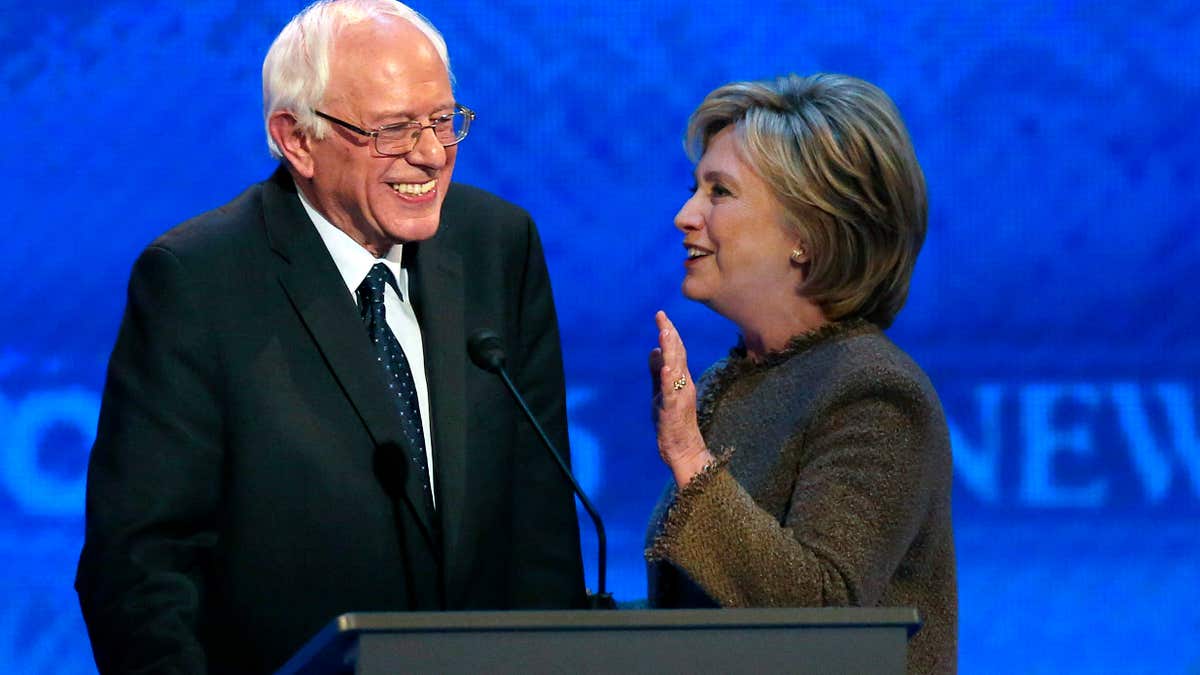
(AP)
The day has finally come!
Tuesday, Bernie Sanders is set to endorse Hillary Clinton after a year-long, hard-fought primary in which he drew crowds of more than 20,000, invigorated young Democrat and Independent voters and advanced a radical, progressive agenda that has fundamentally shifted the conversation in American politics. His unadulterated authenticity made him the favorite of millions who helped him raise over $220 million from grassroots donors in the 2016 campaign cycle.
And although Sanders lost the primary by nearly four million votes, his influence has been outsized.
Just look at the newly conceived Democrat platform.
Sanders scored big progressive victories in almost every policy area. The platform embraces a $15 minimum wage, even though Clinton had been staunch in her $12 position (with the caveat that in cities like New York and Los Angeles it would be $15). The language now reads that Americans should “should earn more than $15 an hour.”
On climate change, even though Sanders’s delegates didn’t get their carbon tax and all-out ban on fracking, they got a compromise in which President Obama’s standard used to reject the Keystone Pipeline XL – a project Clinton previously supported – would be applied to all pipeline projects. The platform also added language to reflect that “greenhouse gases should be priced to reflect their negative externalities,” which isn’t quite a carbon tax, but is a win nonetheless.
And perhaps the Sanders team’s biggest victory came in Clinton’s willingness to back a public option on health care. In accepting a “public option” – a position Clinton has supported before but did not campaign on in 2016 – she backed down in one of the biggest battles of the Democratic primary. We all remember how many times Clinton said that the public option was too expensive and would never get implemented while Republicans controlled the House and Senate.
The platform committee meeting wasn’t all good for Sanders. His delegates were particularly upset that they didn’t get the language they wanted on opposing the Trans-Pacific Partnership trade agreement, including a promise not to bring the deal to a vote. And they didn’t get their language on denouncing Israeli settlements.
Despite this, it was certainly a good result for them. As Bernie Sanders’s top foreign policy advisor boasted, “[Sanders] got 80 percent of what [he] wanted in this platform.
Against this backdrop, a Sanders endorsement of Clinton isn’t surprising. He has said for weeks and months that he was dedicated to influencing the platform and he’s done just that.
But while Sanders’ endorsement is surely a net positive for Clinton, it doesn’t come without complications.
There are still Sanders supporters who are not keen to jump to Clinton, no matter what Sanders says or what organizations like the Communications Workers of America who backed Sanders in December and are now backing Clinton. Recent polling data has shown that up to half of Sanders supporters say they won’t get behind Clinton. We’ve also seen data that shows up to 20% of Sanders supporters breaking for Trump. These numbers are inflated and won’t nearly be as high come election day, as is usually the case, but it’s far from a sure thing that Sanders’s supporters all happily declare #ImWithHer.
Furthermore, Clinton’s left-leaning platform now runs the risk of alienating moderates, Independents and center-right Republicans who can’t bring themselves to back Trump. The positions Clinton stakes in the platform represent the culmination of months of being pushed left by Sanders and the progressive wing of the Democratic Party. That’s all well and good for attracting Democrats, but Clinton is the first Democratic candidate in decades with an opportunity to pick up a hefty haul of voters that would traditionally back the GOP candidate in a general election. A far-left platform like this could very well endanger that potential, at least to some degree. It’s a lot harder to believe that Clinton will shift to the middle with this platform.
It follows that Bernie’s endorsement is far from the last hurdle Clinton will have to clear.








































